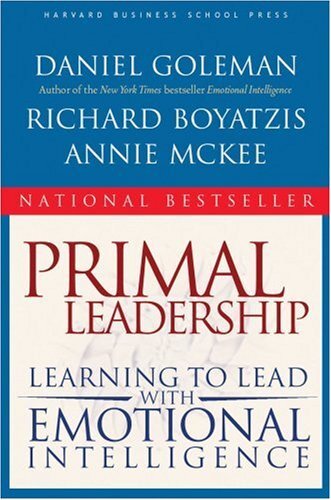Daniel Goleman, Richard Boyatzis and Annie McKee, Primal Leadership: Learning to Lead With Emotional Intelligence. Harvard Business Press, 2004.
- Companion volume: Emotional Intelligence: Why It Can Matter More than IQ (2006).
- Sequel: Goleman, Resonant Leadership (2005).
Referenced in:
LifeandLeadership.com Summary
This in an interesting reflection of the empowering and transformational models of leadership. It comes from Daniel Goleman who is the author of a best-selling series on Emotional Intelligence (EI or EQ). Here, he writes alongside Boyatzis, a management professor, and McKee, an education professor. In their research, the authors sought answers to questions like:
- What emotional resources do leaders need to thrive amidst chaos and turbulent change?
- What gives the leader the inner strength to be honest even about painful truths?
- What enables a leader to inspire others to do their best work and to stay loyal when other jobs beckon?
- How do leaders create an emotional climate that fosters creative innovations, all-out performance, or warm and lasting customer relationships? (xi)
The authors conclude that the fundamental task of leaders is to prime good feeling in those they lead. That occurs when a leader creates resonance – a reservoir of positivity that frees the best in people. At its root then, the primal job of leadership is emotional. (ix) This resonant leadership is much like being musically “in sync,” where the leaders vibrate with their follower’s emotional needs, and the followers in turn respond with a deeper level of focus, commitment, creativity, and collaboration because they feel understood and cared for. (20-21) This is contrasted to dissonant leadership which breeds a lack of harmony in which groups feel emotionally discordant, continually off-key, and at times toxic (these are discussed in greater detail in chapter 5). (21)
They provide a scientific base for their observations about the brain’s functioning in an “open loop.” They argue:
“The reason a leader’s manner – not just what he does, but how he does it – matters so much lies in the design of the human brain: what scientists have begun to call the open-loop nature of the limbic system, our emotional centers. A closed-loop system is self-regulating – for instance, our circulatory system. What’s happening in the circulatory system of others around us does not impact our own. An open-loop system depends largely on external sources to manage itself.” (6)
Chapter 3 presents a list of the four competencies of emotionally intelligent (EI), resonant leadership under two broad categories:
- Personal Competence – Self Awareness and Self Management
- Social Competence – Social Awareness and Relationship Management
The authors acknowledge that very few excel in all four domains, but effective leaders are competent in at least two or three.
In Chapter 4, the authors echo the standard leadership wisdom to adapt leadership styles to the situation, but demonstrate which emotional competencies are required of each style. The styles are:
- Visionary
- Coaching
- Affiliative
- Democratic
- Pace-Setting
- Commanding
Each style has its arenas where it is appropriate and not appropriate, as well as a productive arc of diminishing effectiveness if used inappropriately.
Parts 2 and 3 (chapters 6-11) on the path to EI leadership and EI organizations are not as valuable as Part 1, and the heavy prose makes for difficult access. There is also little in this section that is not expressed more effectively in other works (e.g. the need for vision, motivation, sustainable change).The authors may also overstate their case in putting people above strategy, perhaps approaching the black-and-white thinking warned about in Collins’ and Porras’ Built to Last. Effective leadership thinks in “both-and” terms, balancing EI and strategic initiatives. Even with this caveat, however, Primal Leadership elevates an important dimension of leadership that is especially important for those in positions of spiritual influence.
From the Publisher
Drawing from decades of research within world-class organizations, the authors show that great leaders-whether CEOs or managers, coaches or politicians-excel not just through skill and smarts, but by connecting with others using Emotional Intelligence competencies like empathy and self-awareness. The best leaders, they show, have “resonance”-a powerful ability to drive emotions in a positive direction to get results-and can fluidly interchange among a variety of leadership styles as the situation demands. Groundbreaking and timely, this book reveals the new requirements of successful leadership.
About the Author
Daniel Goleman is Codirector of the Consortium for Research on Emotional Intelligence in Organizations at Rutgers University and is the author of the international bestselling books Emotional Intelligence and Working with Emotional Intelligence. Richard Boyatzis is Professor and Chair of the Department of Organizational Behavior at the Weatherhead School of Management at Case Western Reserve University. Annie McKee serves on the faculty of the University of Pennsylvania Graduate School of Education and consults to business and organization leaders worldwide.
***For additional information on this resource, including reviews, click the bookstore links. Check the reference at page top or the links below for resource guides on related topics.***
Related Areas
See Other Resources on Leadership and Emotional Processes:
See Other Resources on Leadership:
See Related Ministry Resource Guides:
- Change and Transition
- Church Administration
- Church Leadership and Renewal
- Conflict
- Elders, Plural-Elder Congregational Leadership
- Ministry Teams, Ministry Staff
See Resources on Over 100 Areas of Ministry Leadership:


